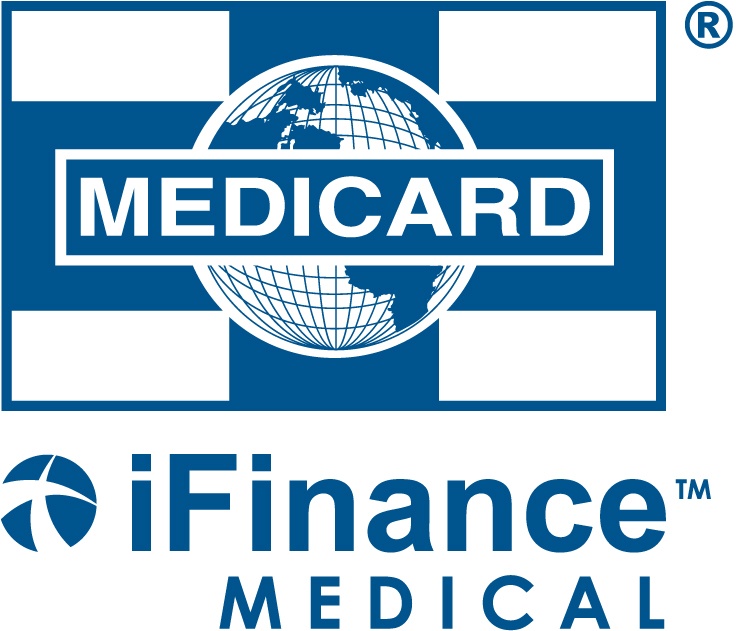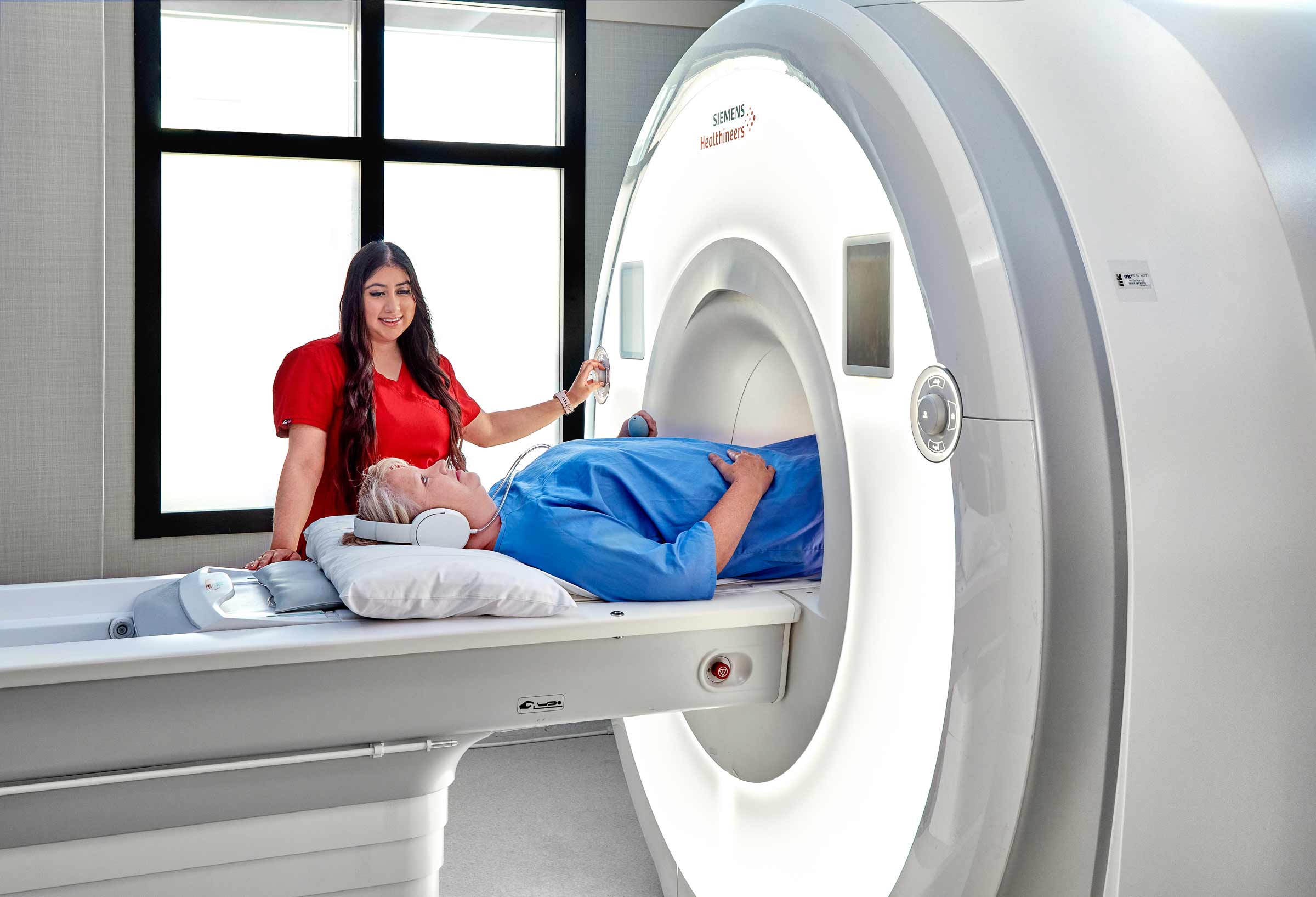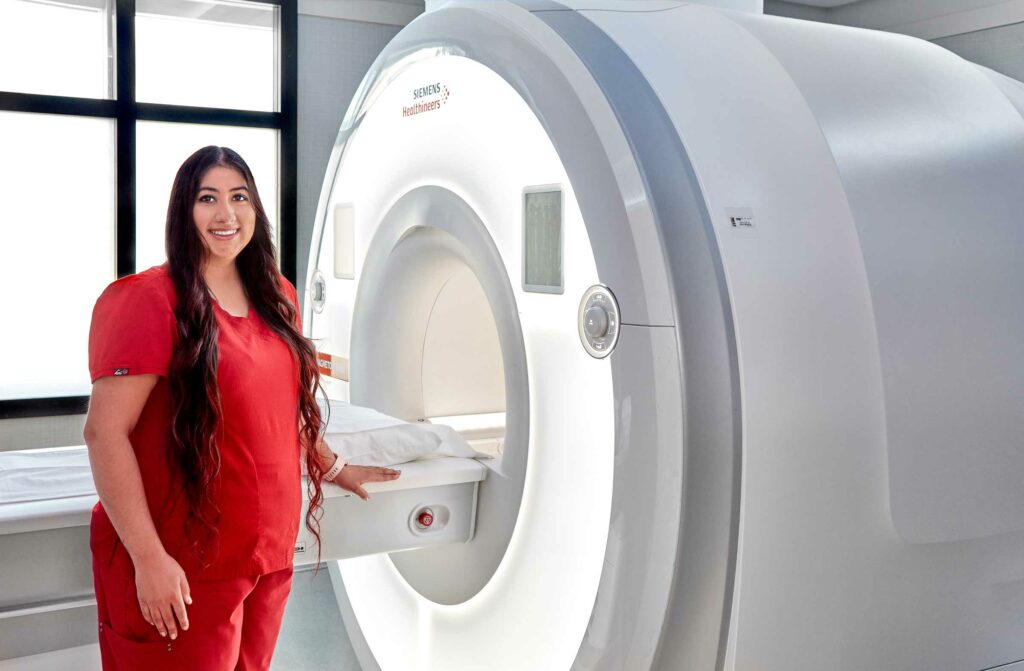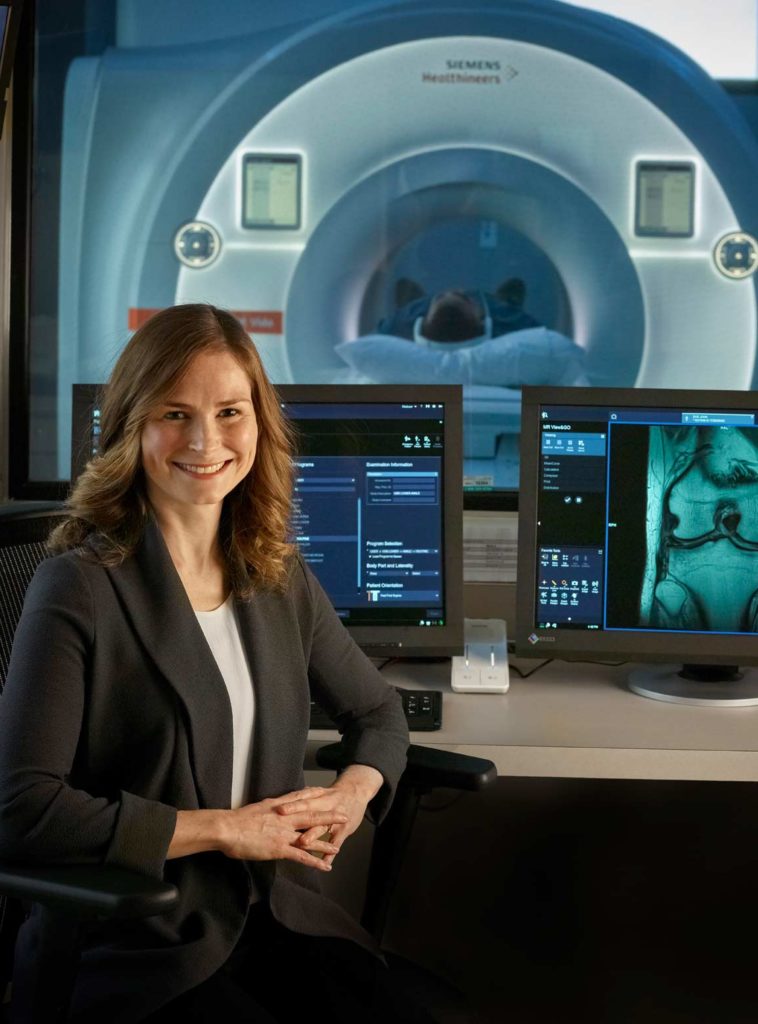Medically reviewed by Dr. Anukul Panu, MD, FRCPC, DABR
What is an MRI?
Magnetic Resonance Imaging (MRI) is a non-invasive medical exam that provides practitioners with information that is often crucial in diagnosing, treating, and managing disease, injuries, and medical conditions.
An MRI is one of the most advanced forms of medical imaging available. It is safe for everyone since it uses a magnetic field instead of ionizing radiation.
Radiologists and healthcare practitioners use MRIs to diagnose conditions in the brain, spine, bones, joints, abdomen, breast, blood vessels, heart, soft tissue, prostate and other parts of the body.
The images created by MRIs are much more detailed than traditional technologies such as x-rays. This gives our radiologists a very clear view of injuries and conditions and helps determine the most effective treatment plan.
How does an MRI work?
An MRI scanner is a large, doughnut-shaped magnet that interacts with magnetic fields, radio waves, sensors and a computer to acquire high-resolution, cross-sectional images of the body in 2D or 3D.
The strength of the magnet is measured in Tesla (T). MIC provides MRI scans on 1.5T and 3T scanners at two convenient locations in Edmonton:
Why choose MIC for your MRI?
MIC provides imaging excellence in our community-based clinics. We invest in the latest technology to empower our staff and improve the patient experience. Our Terra Losa and Century Park clinics each house a Siemens MAGNETOM 3T MRI scanner in addition to a 1.5T scanner.
MIC’s expert radiologists review every image captured by our state-of-the-art technology. These are the same subspecialized radiologists who interpret thousands of MRI scans each year at world-famous institutions, including the University of Alberta, Stollery Children’s Hospital, Mazankowski Heart Institute, Royal Alexandra and Grey Nuns hospitals. They are also the same radiologists trusted by professional athletes to interpret their MRIs, including the Edmonton Oilers, the Edmonton Elks, the Edmonton Oil Kings, and the Edmonton Stingers.
Local physicians in our community trust MIC to deliver comprehensive diagnostic imaging and medical reports to them in a timely manner while maintaining the highest levels of patient care.
Canada’s Largest Radiology Partnership
Our business is owned and operated by Canada’s largest radiology partnership. As a physician-owned practice, our radiologists retain the ability to do what’s best for our patients and prioritize quality of care over other business metrics. Our physicians have a genuine desire to create a better patient experience.
Subspecialized Radiologists
To become a radiologist, you need 12 years of post-secondary education. This includes an undergraduate degree, four years of medical school, a licensing exam, and five years of post-graduate residency. Most radiologists begin their careers at this point.
However, many radiologists at MIC choose to continue their education, subspecializing in a particular area of interest.
To subspecialize, a radiologist must complete a clinical fellowship, which takes an additional 1-3 years of training.
MIC Medical Imaging’s partnership has the most subspecialized radiologists in Alberta who are recognized in their fields for excellence, innovation, research, and unique expertise.
Having the most subspecialized radiologists in the province is important for two reasons:
- When you visit one of our clinics, you know the radiologist interpreting your medical images is an absolute expert in that field – be it abdominal, breast, cardiac, musculoskeletal, neuro, pediatric etc.
- Our subspecialized radiologists can collaborate on unique cases. Since our practice has so many radiologists with clinical fellowships and research in unique fields, our physicians can communicate and utilize in-house expertise to diagnose the rarest and most complex conditions.
When you pay for private MRI in Alberta, you are entitled to imaging excellence.
MIC provides world-class imaging with state-of-the-art Siemens technology and subspecialized, expert radiologists to interpret your results.
Our 1.5T MRI
MIC has been performing MRI scans at various locations in Edmonton for decades. The Siemens Magnetom Espree 1.5T scanner is a wide bore machine.
The large bore (opening) and shorter depth of the scanner make the Espree an excellent alternative for claustrophobic patients.
We’ve put hundreds of professional athletes and weekend warriors back on their feet with the 1.5T Espree and an expert diagnosis from our radiologists. 1.5T MRIs produce excellent images and are the standard of care in community clinics across Canada.
Our 3T MRIs
MIC provides 3T MRI scanning at two community-based clinics: Terra Losa and Century Park. Each location houses a world-class Siemens MAGNETOM 3T MRI. These are the same machines installed in Alberta Health Services hospitals.
The advanced technology in the MAGNETOM 3T scanners allows our subspecialized radiologists to offer breast, prostate, and other neurological, vascular, or musculoskeletal exams that cannot typically be completed on a 1.5T unit.
MIC is committed to excellence in advanced medical imaging. Learn more about our MRI technology, facilities, and approach to private imaging in Edmonton.
How much does an MRI cost?
At MIC, the cost for an MRI is $850, regardless of the scanner. Our fee is the same for our 1.5T and 3T MRI machines.
If a supervising MRI radiologist determines that an intravenous contrast injection is required for a proper diagnosis, an additional fee of $150 will be charged.
Many factors can impact the need for contrast, including patient history. The primary consideration is whether the contrast injection will provide additional information to the diagnosis.
MIC also provides a 50% discount for any additional areas scanned on the same day. More specifically, the cost for a second scan on the same day is $425.
MRIs performed in community-based clinics are not insured by Alberta Health Care insurance.
However, certain extended benefits programs or health spending accounts may cover a portion or possibly the entire exam fee.
It is up to you to pay for the exam and submit a claim for reimbursement. We recommend talking to your employer or a Benefits Specialist before booking your exam to determine coverage eligibility.
MRI Fee Schedule
| Body Area |
Price |
|
| Neuro MRI |
$850.00 |
|
| Neck-Soft Tissue |
$850.00 |
|
| Breast MRI |
|
|
| Breast Parenchyma (includes contrast) |
$1,000.00 |
|
| Silicone Implant Integrity (ONLY) |
$850.00 |
|
| Combined Study (includes contrast) |
$1,000.00 |
|
| Spine MRI (one area) |
$850.00 |
|
| Bone & Joint MRI |
$850.00 |
|
| Body MRI |
|
|
| Thoracic |
$850.00 |
|
| Abdomen |
$850.00 |
|
| Pelvis |
$850.00 |
|
| Prostate (includes contrast) |
$1,000.00 |
|
|
|
|
Contrast
|
$150.00 |
|
Contrast-enhanced MRA
|
$1,000.00 |
|
One scanned area
|
$850.00 |
|
|
|
|
Each additional area |
|
|
| (If multiple areas are examined in the same visit a discount will be applied.) |
$425.00 |
|
We offer a 3rd party finance option:

View More



